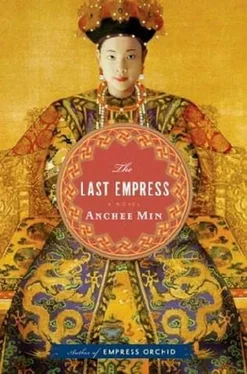There were more reports of locals blaming foreigners for their hardship. Massive unemployment of bargemen on the Grand Canal was brought about by the introduction of steamships and railways. Several bad growing seasons in a row convinced the peasants that the spirits were angry. The governors pleaded for the throne to "ask the barbarians to take away their missionaries and their opium."
There was little I could do. Yung Lu didn't have to remind me of the consequences of murdering missionaries. A German naval squadron had used the violent incidents involving their nationals to seize forts guarding the city of Tsingtao. Kiaochow was occupied, turning the bay into a German naval base.
I tried to gather information on the missionaries and their converts, only to be told bizarre stories: some said the missionaries used drugs to woo converts, made medicine from fetuses, and opened orphanages only to collect infants for their cannibalistic orgies.
In more logical and believable accounts, I found the missionaries' and their governments' behavior disturbing. Catholic churches seemed willing to go to any lengths to increase their conversions, taking in derelicts and criminals. Village ne'er-do-wells facing lawsuits had themselves baptized in order to gain a legal advantage-by treaty agreement, Christians were given Imperial protection.
The mess left by the failed reform movement became a breeding ground for violence and riots. More troublemakers showed up on the political scene, among them Sun Yat-sen, whose idea of a Chinese republic attracted the nation's young. Working with the Japanese, Sun Yat-sen plotted assassination and destruction, especially of the government's financial establishments.
I often conducted audiences alone these days. Guang-hsu's ill health left him so tired that he couldn't be counted on to be more than half awake. I didn't want the provincial governors, who sometimes waited a lifetime to meet with the Emperor, to be disappointed.
I wanted the world to believe that the Guang-hsu regime was still powerful. I carried on so that China could continue to honor the treaties and rights granted to foreigners. In the meantime, I tried to gain understanding for the Boxers. My edict to all governors read: "The result of the failure to distinguish between good and evil is that men's minds are filled with fear and doubt. This proves not that the people are inherently lawless, but that our leaders have failed."
I removed the governor of Shantung province after two German missionaries were killed there. I replaced him with the no-nonsense Yuan Shih-kai. I didn't order the former governor's prosecution-I knew such a move would enrage the citizenry and make myself more vulnerable. Instead, I had him transferred to another province, away from any heated response by the Germans. My investigation revealed that the main reason the former Shantung governor came under the intense pressure of the German government was not the death of its missionaries but the rights to China's resources.
Another governor also reported trouble. He had tried to strike a balance by cajoling the Boxers into remaining a defensive and not an aggressive force. But before long the Boxer hooligans were setting fire to the railways and Christian churches and occupying government buildings. "Persuasion can no longer disperse the rebels," the governor cried, asking for permission to suppress them. "Our commanders, if hesitant and tolerant, will certainly lead us into unnecessary calamities."
In Shantung, the new governor, Yuan Shih-kai, took matters into his own hands. He ignored my admonition that "the people must be persuaded to disperse, not crushed by brute force," and he hounded the Boxers out of his province.
"These Boxers," Yuan wrote afterward in his telegram to the throne, "are gathering people to roam the streets. They cannot be said to be defending themselves and their families. They are setting fire to houses, kidnapping people and resisting government troops; they are freely engaging in criminal activities; they are plundering and killing the common people. They cannot be said to be merely anti-Christian."
Because of the political disruptions, governments in villages along the Yellow River neglected the ever-present problem of flood control. In the summer of 1899 a disaster of great magnitude took place. Thousands of square miles in the north of China were inundated, crops were destroyed, and famine followed. Next came a period of drought, resulting in a million farming families becoming homeless. The recruitment of Boxers soared. "Until all the foreigners have been exterminated, the rain will never visit us," the frustrated poor believed.
Under pressure from the Ironhats, the court began to lean toward supporting the Boxers. After being driven out of Shantung by Yuan Shih-kai, the Boxers traveled north, crossing Chihli province and then on to Peking itself. Joined along the way by thousands of peasants who believed they were invulnerable, the Boxers became an unstoppable force in Chinese society. "Protect the Manchu Dynasty and destroy the foreigners!" men shouted as they encircled the foreign legations.
Yung Lu and I were helplessly undecided about whether or not to suppress the Boxers. The rest of the court, however, had made up their minds to join them.
Yung Lu told me that he had no faith in the Boxers' true ability to win battles against foreign invaders. Yet I couldn't get him to challenge the court. I asked him to submit a memorandum, and I would explain to the court why the Boxers must be stopped. He agreed.
When I received Yung Lu's draft, I thought about how strange our relationship had become. He was my most loyal and trusted official, and I depended on him constantly. We had come a long way from the days when we were young and poised on the brink of passion. I could, and did, relive those moments at my most private times. Now we had grown old, and the roles that brought us together were both comfortable and absolute. The feelings were still there, but they had mellowed and become deeper and lived side by side with the fact that now, in the midst of China's turmoil, our lives and survival depended on each other.
The day I read Yung Lu's draft to the audience, Princes Ts'eng and Ch'un accused me of losing momentum in the war against the barbarians. With the Boxers already massed in Peking's legation district, the princes had come to obtain the throne's permission to move in for the kill.
I started by saying that it was indeed gratifying for the throne to see our people display courage, to witness their enthusiasm for settling old scores against the foreigners. Then I asked the youths to bear in mind the consequences of their actions and to temper their fury before reality was swept away.
I told them what Yung Lu had told me: "As a fighting force the Boxers are absolutely useless, but their claims to supernatural arts and magic might help to demoralize the enemy. It would be quite wrong, not to say fatal, however, for us to attach any real belief to their ridiculous claims, or to regard them as of any real use in action."
My speech had the desired effect. Several of the conservatives ended up voting to cancel any immediate action against the legations. Nevertheless, the Boxer movement continued to ferment, and I knew that before long I would run out of options.
Requests for instructions on handling the situation continued to come in from all over the country. Yung Lu and Li Hung-chang devised a strategy. The throne would focus on discouraging the Boxers in southern China, where foreign nations had the most commercial enterprises and where we were vulnerable to intervention. The edict read, "The main goal is to prevent the throne's decree from becoming an excuse for the banding together of disorderly characters."
Once again the edict sounded ambiguous. It didn't condemn outright, but granted a degree of autonomy so that Li Hung-chang and other southern governors could carry on business as usual with foreign countries and suppress the Boxers, when necessary, with their provincial armies.
Читать дальше












